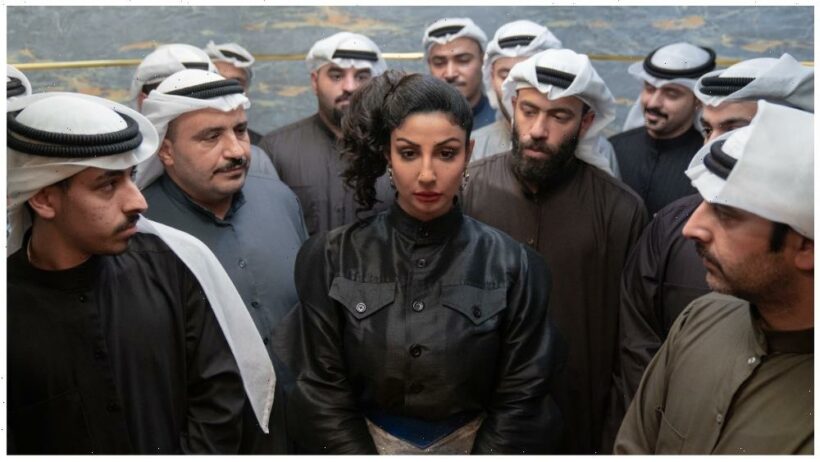On Feb. 8, Netflix will drop “The Exchange,” the streamer’s first original series from Kuwait.
Set in 1988, on the eve of Saddam Hussein’s invasion of the city-state, this groundbreaking show is based on the true story of the first two women who broke the glass ceiling of Kuwait’s male-dominated stock exchange and proved themselves as talented traders in the cutthroat milieu.
The protagonists are Farida (Rawan Mahdi), a recent divorcee who, without her ex-husband’s cash, needs to provide for her teenage daughter, and her cousin Munira (Mona Hussain), a clerk for the Bank of Tomorrow’s trading division. They join forces to navigate a corrupt, patriarchal world, using their smarts to shake up Kuwait’s stock exchange.
“The Exchange” was created and written by Nadia Ahmad, Anne Sobel and Adam Sobel; produced by Abdullah Boushahri; and directed by Jasem AlMuhanna (“The Cage”) and Karim El Shenawy (“Blood Oath”).
Ahead of the streamer’s release of “The Exchange” in 180 countries, Variety spoke to Ahmad and Boushahri about the challenges of bringing Kuwait’s first Netflix original to the screen and what it can mean for the rest of the Gulf region.
Nadia, as I understand it, this story stems from your personal background?
Ahmad: Yes. The investment banking business was a big thing in the ’70s and ’80s in Kuwait. There was lots of money to go around and not enough people doing money management, you know what I mean? The stock exchange was booming, investment banking was booming. It was where you would go if you wanted to make some serious money. My mom was a single mom — she was solely financially responsible for me, and she wanted the best for me. So she entered the investment banking world, and I was consistently around women who were also doing the same thing, who were shattering stereotypes of Khaleeji [people of the Arabian Peninsula] women. These women were pioneers, they were the first to enter these male-dominated spaces.
So yeah, it was me reflecting on my childhood and my adolescence and wanting to bring something to the screen that encompassed complex, multi-dimensional characters. Female characters that I didn’t see enough of from this region. And I’m really happy with how it came out.
What were the main challenges from a production standpoint?
Boushahri: The minute they talked to me about the idea and the subject matter, I immediately told them that it would be a big challenge to make this show. Because it is not a typical love story or a typical action film. It’s a story that happens in a workplace, which makes it very tough to make it entertaining. So in the beginning, the subject matter seemed very, very challenging. I was afraid of getting into a show that would be just about offices and people, which would make it difficult for people to follow. Especially since it talks about the financial world and the stock exchange.
But I’m a very big fan of “The Wolf of Wall Street.” Martin Scorsese is one of my role models. So, in a way, initially that film gave me comfort that this world could be entertaining. And then when I started reading the scripts, I realized that in “The Exchange” there are just so many human emotions, and so much woman-power and groundbreaking topics and types of stories that have never been told in this way before.
I found it interesting that early on we learn that Farida is a divorcee, and that her father is her guardian.
Ahmad: Well, that’s a very subtle sort of nod to the fact that in the West, women are responsible for themselves. The second they turn 18, they are legally independent. Whereas in the Gulf and in the Arab world, women are essentially under the guardianship of the men in their family. If it’s not their father, it’s their brother. If it’s not their brother, it’s their husband. That was the case in the ’80s. But even now, we are still fighting for our rights, for our own guardianship. Whether it’s in Saudi Arabia or Kuwait, we are still doing that.
Kuwait has long been a TV production hub in the region, but strictly for local product. How significant is this show in terms of reaching a global audience?
Boushahri: What I can say is that Netflix told me that they see Kuwait as a gateway to the [Gulf] region. That’s why they chose Kuwait as the first country in which to do this type of show.
https://youtube.com/watch?v=-9W1W3qXnUk%3Fversion%3D3%26%23038%3Brel%3D1%26%23038%3Bshowsearch%3D0%26%23038%3Bshowinfo%3D1%26%23038%3Biv_load_policy%3D1%26%23038%3Bfs%3D1%26%23038%3Bhl%3Den-US%26%23038%3Bautohide%3D2%26%23038%3Bwmode%3Dtransparent
This interview has been condensed and edited.
Read More About:
Source: Read Full Article
